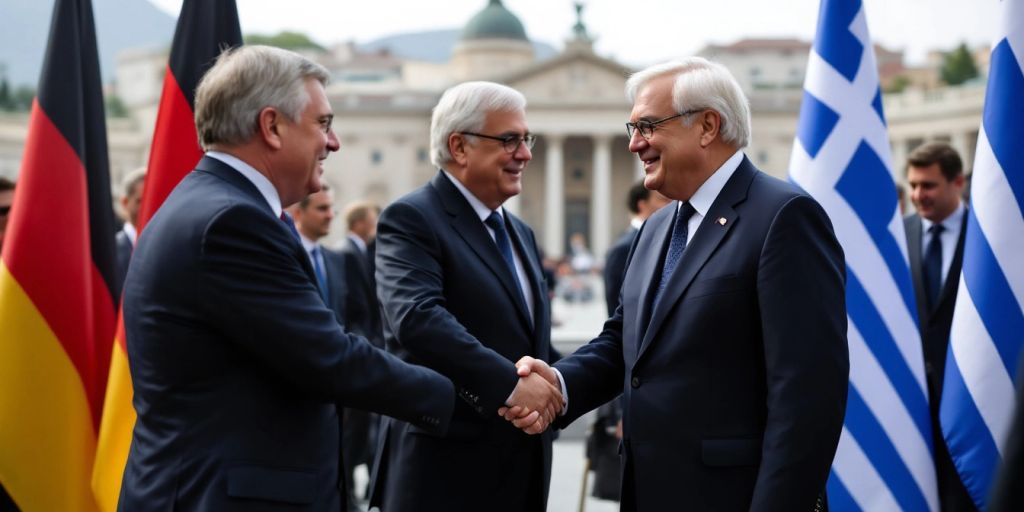German President Frank-Walter Steinmeier recently embarked on a significant three-day official visit to Greece, aimed at strengthening bilateral relations and addressing historical ties. The visit, which took place from October 29 to 31, included meetings with Greek leaders and visits to key historical sites.
Key Takeaways
- Steinmeier’s visit marks a new chapter in Greek-German relations.
- The agenda included discussions on economic cooperation and historical remembrance.
- The visit featured significant events in Thessaloniki, Athens, and Crete.
Overview of the Visit
President Steinmeier’s visit began in Thessaloniki, where he was welcomed by Greek President Katerina Sakellaropoulou. The leaders visited the site of the future Holocaust Museum, emphasizing the importance of historical remembrance. They also met with Holocaust survivors and participated in a symbolic tree planting ceremony, highlighting the commitment to preserving memory and fostering unity.
Following the events in Thessaloniki, Steinmeier traveled to Athens, where he laid a wreath at the Tomb of the Unknown Soldier. This act of remembrance set the tone for his discussions with Greek officials, including a private meeting with President Sakellaropoulou and a subsequent meeting with Prime Minister Kyriakos Mitsotakis.
Strengthening Economic Ties
During his discussions with Prime Minister Mitsotakis, Steinmeier expressed optimism about the strengthening economic ties between Germany and Greece. The two leaders discussed various topics, including:
- International Developments: Addressing current global challenges and their impact on both nations.
- Bilateral Economic Cooperation: Exploring opportunities for German investments in Greece, particularly in sectors like technology and renewable energy.
- Cultural Exchange: Emphasizing the importance of cultural ties and people-to-people connections.
Mitsotakis highlighted Greece’s improved economic position, which has fostered a more favorable environment for German businesses. He also raised the sensitive issue of German war reparations, indicating that while it remains a point of contention, it should not hinder the progress of bilateral relations.
Historical Remembrance and Reconciliation
A significant aspect of Steinmeier’s visit was the focus on historical remembrance, particularly regarding the atrocities committed during World War II. The German President’s acknowledgment of this dark chapter in history is crucial for reconciliation between the two nations. Key events included:
- Visit to the Holocaust Museum Site: A commitment to preserving the memory of Holocaust victims.
- Wreath Laying in Kandanos: Steinmeier’s visit to the village of Kandanos in Crete, where he laid a wreath at a war memorial dedicated to the victims of the Nazi massacre in 1941.
These gestures reflect a broader commitment to addressing historical grievances while fostering a spirit of cooperation and unity.
Conclusion
President Steinmeier’s visit to Greece marks a pivotal moment in the evolution of Greek-German relations. By addressing both the historical context and the potential for future collaboration, the visit underscores a mutual desire to move forward together. As both nations navigate the complexities of their shared history, this visit serves as a reminder of the importance of dialogue, remembrance, and partnership in building a brighter future together.
Sources
- German President Steinmeier begins three-day official visit to Greece | eKathimerini.com, eKathimerini.com.
- Federal President of Germany Steinmeier pays official visit to Greece – Πτήση, Πτήση.
- German President Steinmeier in Greece: A new era of unity – Neos Kosmos, Neos Kosmos.
- Strengthening Ties Amid Shadows of History: Pres. Steinmeier in Greece – tovima.com, tovima.com.






